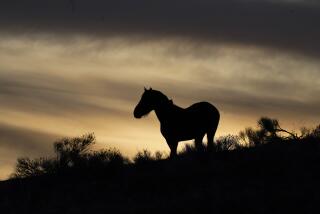Possibly Infected Vt. Sheep Will Be Killed
- Share via
MONTPELIER, Vt. — A federal judge ruled Tuesday that two flocks of sheep the federal government says might suffer from a version of the always-fatal mad cow disease should be killed.
U.S. District Judge J. Garvan Murtha in Brattleboro refused to issue an injunction that would have stopped the slaughter of the flocks, which are owned by Larry and Linda Faillace of East Warren, and Houghton Freeman of Stowe.
The Faillaces and Freeman argued the tests used by the federal government to condemn their sheep were inconclusive.
“When preventing diseases with lengthy incubation periods . . . the [U.S. Department of Agriculture] cannot be expected to wait until clinical signs of disease appear,” the judge wrote, “because any actions implemented at that time would be taken years too late.”
The judge said the owners have until Monday to appeal.
Thomas Amidon, a lawyer representing Freeman, said an appeal is possible. “We are looking at what our options [are]. We haven’t made any decisions yet,” he said.
“Obviously we knew that we had a huge burden to overcome going in,” Amidon said. “But we really had to have someone look at it. To that extent we are appreciative to the fact that a third party--the judiciary--has taken a look at it.”
Last month Agriculture Secretary Dan Glickman ordered 376 sheep in the two flocks to be destroyed after tests on the carcasses of four animals from Freeman’s farm were found infected with a transmissible brain disease that could be bovine spongiform encephalopathy, the scientific name for mad cow disease.
The owners of 21 sheep in a third flock voluntarily sold their sheep to the USDA to be destroyed before Glickman’s order.
Mad cow disease devastated the cattle industry in Great Britain in 1995. It has killed about 70 people in Europe and, because the incubation period of the disease can be up to 10 years, the number of human victims is expected to rise.
Even though scientists aren’t sure the four Vermont sheep carcasses had a form of mad cow disease, the USDA says it’s better to destroy them and avoid any possibility the disease could gain a foothold in North America.
The sheep in all three flocks either were imported from Belgium in 1996 or are the offspring of imported sheep. The USDA feels the sheep might have eaten contaminated feed in Europe before they were brought to Vermont.
More to Read
Sign up for Essential California
The most important California stories and recommendations in your inbox every morning.
You may occasionally receive promotional content from the Los Angeles Times.













